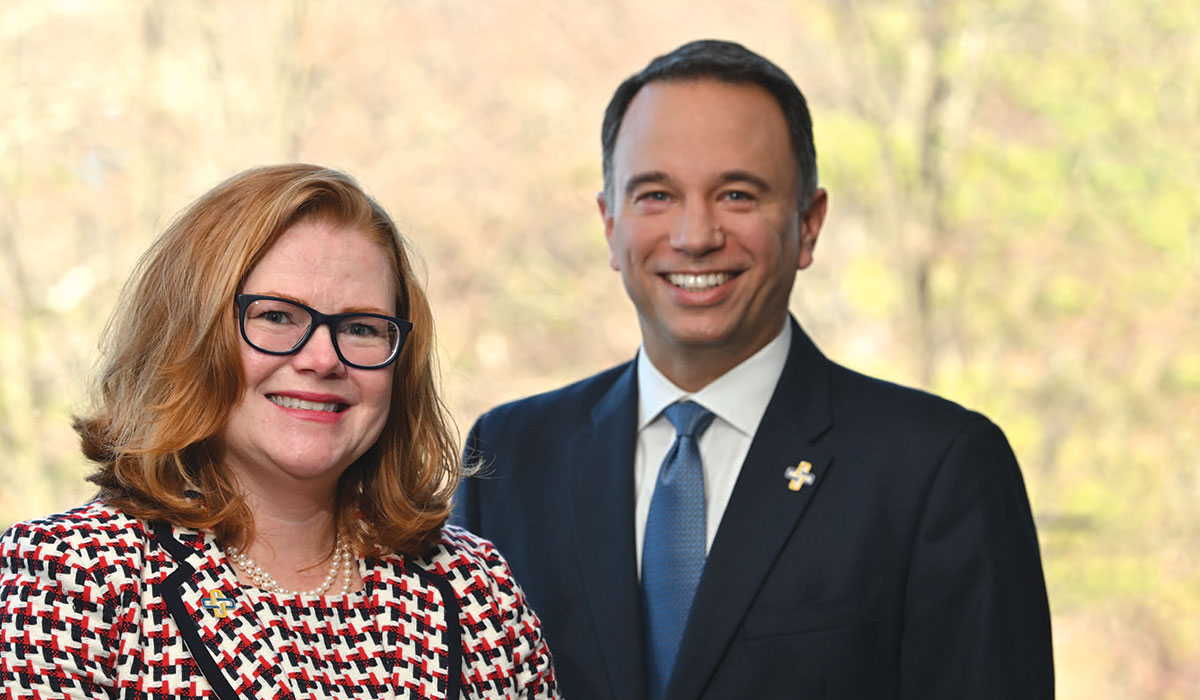

St. Joseph's Health
As a student sledding down a snow-covered incline near Marist Hall on a cafeteria tray, Jennifer (Kiley) Mendrzycki, B.A. 1994, never guessed that she and her contemporary, Rob Budelman III, B.A. 1995, would one day be joined on an even more wild ride as hospital administrators in charge of responding to the COVID pandemic.
In fact, she and Budelman didn’t know each other during their overlapping years on campus. They first met nearly a quarter of a century later, after taking executive posts on the leadership team at St. Joseph’s Health in New Jersey. At first, Mendrzycki, now a senior vice president, didn’t realize that the person she interviewed for the job of vice president and chief development officer was a fellow Cardinal.
“I interviewed Rob before he was hired, but didn’t look closely at his education background,” Mendrzycki said. “I noticed it later. He hadn’t been here very long, and I pulled him aside. When he said he graduated a year after me, I was amazed.”
“We were both surprised,” Budelman said, adding that he and Mendrzycki frequently cross paths at work. Due to the COVID pandemic, their interaction during the past year has been mostly in video conferences.
When their health system’s first COVID patient arrived in early March 2020, Budelman happened to be the senior administrator on call. That evening, he helped open up a command center to respond to the crisis. And he was pleased to find that his work in development did not grind to a halt.
“I thought to myself, ‘Who’s going to want to donate, now that the world is shutting down?’” Budelman said. “But quite the opposite happened. We saw this outpouring of support — donations of masks, face shields, meals, and money. We really worked from sunup to sundown handling this influx of generosity.”
“The outpouring from the community was phenomenal,” Mendrzycki said. “We would bring food, gifts, and cards up to the nurses. We joined them on rounds, and at a certain point we were helping to clean out garbage cans. We would do whatever we could to support colleagues who were taking care of patients.”
In crisis-response mode, the leadership team adopted an “all hands on deck” approach. When ventilators were running low, for example, Budelman was called on to assist with their procurement.
“It was stressful,” Mendrzycki said, “because there were so many patients coming in and we didn’t know a lot about the disease or how to fight it. It was a challenging time for everyone, and it was the same across the country.”
In the effort to make sure as many patients as necessary could be accommodated, St. Joseph’s Health added more than 100 beds during that period.
“We wound up in a place where we had enough beds,” Mendrzycki said, “but we had made plans for the next place we were going if we needed more. Our sole focus was on how to take care of these patients and get them home safely.”
As part of that focus, St. Joseph’s leadership team worked hard to support nurses, doctors, and other hospital workers, and to supply them with everything they needed to treat patients and keep themselves well, including personal protective equipment and the most up-to-date information available.
“It was very different from what I ever envisioned myself doing,” Budelman said, “but it was an experience I’ll never forget. Beyond the heroism of frontline workers, healthcare is an exciting field to be part of because it’s evolving daily.”
Now friends as well as colleagues, Budelman and Mendrzycki both have fond memories of Catholic University.
“I loved the fact that you could be in Washington, D.C.,” he said, “but it didn’t feel like it because you had this campus with open spaces.”
“We got some good snow,” Mendrzycki said with a laugh, recalling those downhill trips on a tray borrowed from the dining hall.
— G.V.